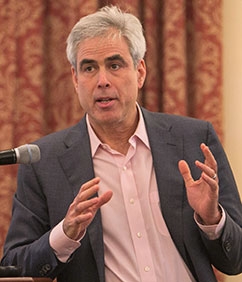Democracy Now?
Scholars and officials examine the state of politics and the rule of law in the United States.
The national conversation on the state of US democracy found ready audiences at NYU Law last academic year as thought leaders visited the Law School to share their views.
Last October, a few months before announcing his run for the presidency, Julián Castro, former secretary of housing and urban development in the Obama administration, engaged in conversation with Maria Hinojosa, the anchor of National Public Radio’s Latino USA, at an event organized by NYU Law’s Brennan Center for Justice. In a wide-ranging exchange, Castro discussed the challenges facing Latinas and Latinos in the current US political climate, the damage caused by the Trump administration’s family separation policy at the border, and affirmative action in higher education.
“It feels like this is a time when a lot of the leadership in Washington, DC, is hellbent on pushing back against [Latino advancement],” said Castro, “and on limiting people again and picking and choosing who gets opportunity.”
Harold Koh, legal adviser of the US State Department during the Obama presidency, contended at a November event hosted by the Reiss Center on Law and Security and the online forum Just Security that the rule of law in the United States is more powerful than President Donald Trump. In a discussion with CNN legal analyst Jeffrey Toobin, Koh asserted that, by ignoring many governmental norms, the Trump administration has invited legal challenges and bureaucratic resistance. “If you actually totaled up what’s happened in the last two years,” said Koh, “there’s been much less real accomplishment and much more of a rattling of the cages.”
Not all battles occur at the federal level. State attorneys general must stand up to policies and actions from the Trump administration that they view as illegal—but they should also avoid taking a purely reactive stance, New Jersey AG Gurbir Grewal argued in an October talk that was organized by the Center on the Administration of Criminal Law.
Grewal offered a two-part test for state attorneys general who are confronted by an apparent abuse of power by the federal government: is the federal government’s action wrong on the law, and does it affect your state’s residents? Grewal has challenged efforts to rescind the Deferred Action for Childhood Arrivals (DACA) program and the Trump administration’s plan to allow offshore drilling on the Atlantic coast.
“The role of the state AG should not just be about reacting to the latest crisis coming out of Washington,” he said. “We have to show others what our vision looks like.”
Some visions are more troubling than others. US democracy is a finely calibrated and fragile instrument, warned Professor Jonathan Haidt of NYU Stern School of Business during a keynote last November for the Law Alumni Association Fall Conference on “Democratic Distortions.” (The talk doubled as a Latham & Watkins Forum.)
Drawing on research in moral psychology, Haidt identified stressors intensifying divisiveness in American society and politics. Although humans share basic values such as compassion, fairness, liberty, loyalty, sanctity, and authority, he said, liberals and conservatives assign different weights to such values—and those differences are increasing, in large part because of social media, making politics “more like a fundamentalist religion.”
“[Humans] are unsuited for life in large, diverse, secular societies, unless…you get certain settings finely adjusted to make possible the development of stable political life,” Haidt said. “So, clearly, it’s possible for us to live this way, but what I’d like to suggest is that the margin for error may be very small.”
Posted September 4, 2019



